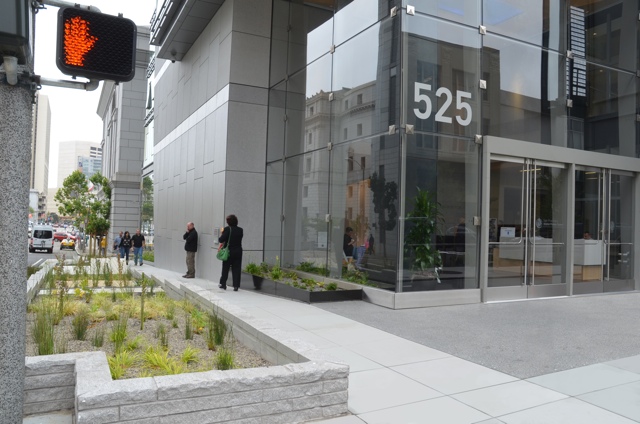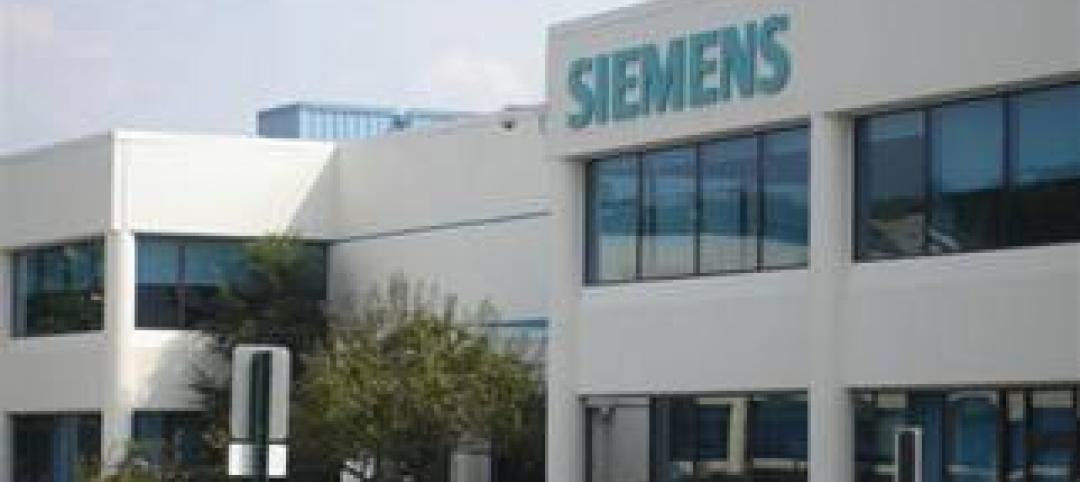Last week, the city of San Francisco announced the grand opening of the Greenest Urban Office Building in North America. The new San Francisco Public Utilities Commission Building (SFPUC) boasts new Living Machine technology, as well as LEED Platinum standards.
The 13-floor building can hold around 900 people, but consumes 60% less water and 32% less energy than most buildings of its kind. The building can achieve these high levels of conservation due it its on-site grey and black water treatment.
The technology for this treatment, The Living Machine, reclaims and treats all of the building’s wastewater– meeting the demand for all of the buildings toilets. The Living Machine can treat 5,000 gallons of water daily, reducing per-person water use from 12 to five gallons. The building also has a rainwater harvesting system that can store up to 250,000 gallons of water annually for use in the building’s irrigation systems.
As far as power goes, the building uses a greenhouse gas-free power from the Hetch Hetchy Reservoir, but also has an integrated hybrid solar array as well as a wind turbine that can generation about seven percent of the building’s annual energy needs.
The building was designed with a raised flooring system to house its data and ventilation infrastructure that also reduces heating, cooling and ventilation costs by over half. They also plan to do the more simple things, like automatically shut off workstation power after business hours, use more sustainable building materials, and limit parking to encourage alternative transportation among employees.
“The unique hybrid wind-solar installation combined with the use of onsite, recycled wastewater makes 525 Golden Gate one of the most self-sustaining buildings anywhere in the world,” said SFPUC General Manager Ed Harrington as part of the announcement. “We did not spare any detail to demonstrate the water-saving and energy efficiency revolution that all of us must start to embrace.”
However, the building cost the city a whopping $146.5 million– which brings back the argument between building new energy efficient buildings, or spending the money to make the ones we already have perform better. There isn’t a right answer, what’s probably best is for there to be a combination of the two– a new building should be built to high energy standards, but some time and resources should be taken to reboot the clunky power-wasters that remain in every city.
Employees are set to move in to their new space in July and August, and the building is set to be on track for its Platinum LEED ranking within a year of operation. The SFPUC estimates that building and owning its new headquarters will allow the department to save residents around $3.7 billion over the expected 100 year life of the building. +
--
Beth Carter is a contributing editor for SmartPlanet.
Related Stories
| Feb 24, 2012
Skanska hires Tingle as senior VP and national director for its Sports Center of Excellence
Tingle has worked in the architecture and construction industries for more than 30 years, and for the last 23 years, he has focused primarily on large-scale sports construction projects
| Feb 23, 2012
Federal budget cuts put major building projects on hold
A plan to build the National Bio and Agro-Defense Facility in Kansas is among several major building projects in jeopardy after the Obama administration’s 2013 budget was unveiled. The budget would cut all construction spending for the facility.
| Feb 23, 2012
Regulators investigating construction accident at World Trade Center
The New York Port Authority and the city’s fire and building departments are investigating an accident at the World Trade Center construction site in lower Manhattan after a crane dropped steel beams that fell about 40 stories onto the truck that delivered them.
| Feb 22, 2012
ACI BIM manual for cast-in-place concrete in development
The improved communication, coordination, and collaboration afforded by BIM implementation have already been shown to save time and money in projects.
| Feb 22, 2012
Siemens earns LEED certification for Maryland office
The Beltsville facility, which also earned the ENERGY STAR Label for energy performance, implemented a range of energy efficiency, water conservation and sustainable operations measures as part of the certification process.
| Feb 22, 2012
CISCO recognizes Gilbane for quality construction, design, and safety
The project employed more than 2,000 tradespeople for a total of 2.1 million hours worked – all without a single lost-time accident.
| Feb 22, 2012
Perkins Eastman expands portfolio in China and Vietnam
Recent awards, project progress signal ongoing commitment to region.
| Feb 22, 2012
Suffolk awarded Boston post office renovation project
Renovation of art deco landmark will add 21,000 square feet of retail and 110 new parking spaces.
| Feb 21, 2012
Top 10 trends in commercial lenders’ environmental due diligence
EDR offers free webinar on February 22, 2012 at 1 p.m.

















